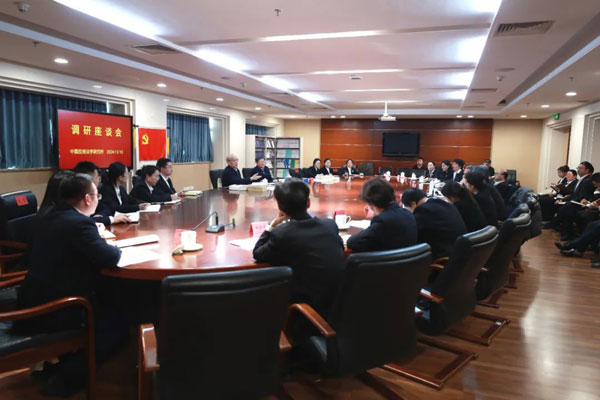Zhang Jun urges applied jurisprudence research to advance judicial modernization
On Dec 10, Zhang Jun, president of the Supreme People's Court, visited the China Applied Jurisprudence Institute, where he held a symposium attended by frontline researchers to review this year's work in applied jurisprudence research.

Zhang Jun, president of the Supreme People's Court, visits the China Applied Jurisprudence Institute and holds a symposium attended by frontline researchers to review the year's work in applied jurisprudence research on Dec 10. [Photo/court.gov.cn]
During the meeting, Chen Zhiyuan, president of the China Applied Jurisprudence Institute, presented an overview of the work done over the past year and highlighted the issues that still need to be addressed, offering suggestions for the future direction of applied jurisprudence research work.
While addressing the meeting, Zhang stressed the need to firmly maintain the right political orientation and closely integrate research work with the practical aspects of judicial proceedings to advance the modernization of judicial work through the high-quality development of applied jurisprudence research.
It is imperative to base applied jurisprudence research on China's national conditions and Chinese characteristics, firmly upholding the Party's leadership to ensure the correct political orientation in research work, he said.
He highlighted the integration of political awareness and professional development as the foundation for producing high-quality results in applied jurisprudence research, and stressed the importance of making research work align with economic and social development. Research needs to delve into new changes in social disputes and produce forward-looking and targeted reference for decision making so as to transform the advantages of the socialist system with Chinese characteristics into governance efficiency, he added.
Application is both the key point and highlight of applied jurisprudence research, according to Zhang. It is important for researchers to actively identify issues and research on the solutions in order to serve judicial practices with high-quality outcomes, he said, calling for proactively identifying new situations and challenges from the judicial Q&A platform, the online case archive, and judicial data analysis.
Meanwhile, theoretical research on adjudication management need to be strengthened and advanced experiences from other countries need to be learned to continuously improve adjudication management practices with Chinese characteristics that are in line with judicial principles, he said.
He also underscored the necessity of innovation in applied jurisprudence research while upholding original aspirations, in a bid to produce more high-quality research outcomes that are conducive to enhancing the public's sense of fairness and justice and strengthening the foundation of the Party's governance.









